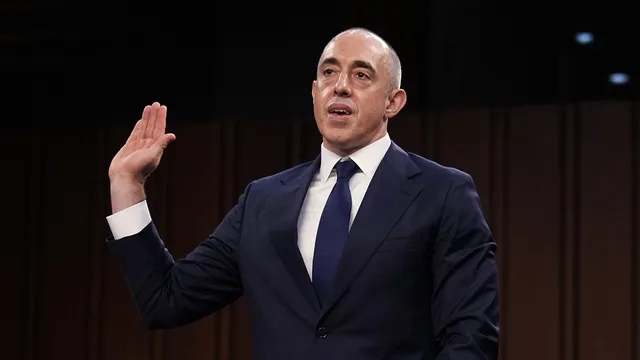
Emil Bove faces allegations over DOJ misconduct before judgeship confirmation
2025-06-25 21:38- Emil Bove, a former Trump attorney nominated for a federal judgeship, has garnered attention due to serious allegations regarding his conduct.
- A whistleblower complaint highlighted that Bove suggested ignoring court orders during his tenure at the DOJ.
- These controversies raise doubts about Bove's suitability for a lifetime appointment on the federal bench.
Express your sentiment!
Insights
In the United States, Emil Bove, a former personal attorney for President Donald Trump, has been nominated for a judgeship on the 3rd U.S. Circuit Court of Appeals. Ahead of his confirmation hearing, which took place recently, serious allegations surfaced regarding Bove’s conduct during his time as a Deputy Attorney General. A whistleblower complaint highlighted instances in which Bove allegedly suggested that the DOJ could ignore court orders in order to fulfill Trump's aggressive immigration policies, raising concerns about his suitability for a lifetime position on the bench. Bove has been a controversial figure, with critiques focusing on his handling of the corruption case against New York City Mayor Eric Adams, as well as his approach to the January 6 investigations and the administration’s broader deportation strategies. These controversies have prompted a significant backlash within legal and judicial circles, leading to numerous resignations from DOJ officials who disagreed with his directives. Nevertheless, Bove has defended his actions, claiming his decisions were made in line with his beliefs about the rule of law. The political context surrounding his nomination has been especially charged, as it coincides with ongoing disputes over judicial appointments by the Trump administration, complicating his path to confirmation. Senators from both parties expressed their concerns during the hearing, questioning Bove about his past and the implications of his actions while at the DOJ. Most notably, the allegations surrounding Bove's willingness to disregard judicial authority raised fundamental questions about his temperament and adherence to legal ethics, making his confirmation a focal point for broader discussions about the integrity of the justice system during Trump's presidency. His nomination highlights the ongoing battle over judicial appointments that could shape the American legal landscape for years to come.
Contexts
The judicial nominations during the Trump administration significantly reshaped the federal judiciary, impacting not only the Supreme Court but also the lower courts across the United States. President Donald Trump's approach to judicial appointments focused on filling vacancies with conservative judges who adhered to an originalist interpretation of the Constitution. This strategy was largely facilitated by the Federalist Society, a conservative legal organization that vetted numerous candidates for the administration, ensuring that Trump's nominations aligned with conservative legal philosophies. By the end of his term, Trump had successfully appointed three Supreme Court justices—Neil Gorsuch, Brett Kavanaugh, and Amy Coney Barrett— cementing a conservative majority that altered the ideological balance of the Court for potentially decades to come. In addition to the Supreme Court, the Trump administration made significant strides in nominating judges to the lower federal courts. By the time he left office in January 2021, Trump had appointed over 230 judges to the federal bench, including 54 appellate judges, 174 district judges, and 3 judges to the Court of International Trade. These nominations focused predominantly on federal appeals courts and trial courts, which play a crucial role in shaping legal precedents and interpreting federal law. The appointments were made at a rapid pace, significantly outpacing previous administrations in terms of the number of judges confirmed by the Senate. Trump's judicial nominations garnered attention not only for their conservative leanings but also for the demographic diversity of some of his appointees. His administration emphasized the appointment of younger judges, aiming to influence the judiciary long-term. Notably, Trump appointed a record number of women and minorities to federal judgeships, which was a departure from the overwhelmingly white male demographic that had characterized federal judiciary appointments in prior administrations. This focus on diversity, however, was often overshadowed by the ideologically charged nature of the nominees, many of whom had a track record of rulings in line with conservative principles. The impact of Trump's judicial nominations continues to unfold, particularly as cases regarding contentious issues such as abortion, gun rights, and healthcare wind through the courts. The appointments have radically shifted the landscape of American jurisprudence, fostering a legal environment that prioritizes conservative interpretations of the law. As legal challenges arise in various sectors of society, including those addressing the ramifications of executive power and civil liberties, the judges appointed during the Trump administration will play a pivotal role in determining the future of multiple legal issues that directly affect the American populace.